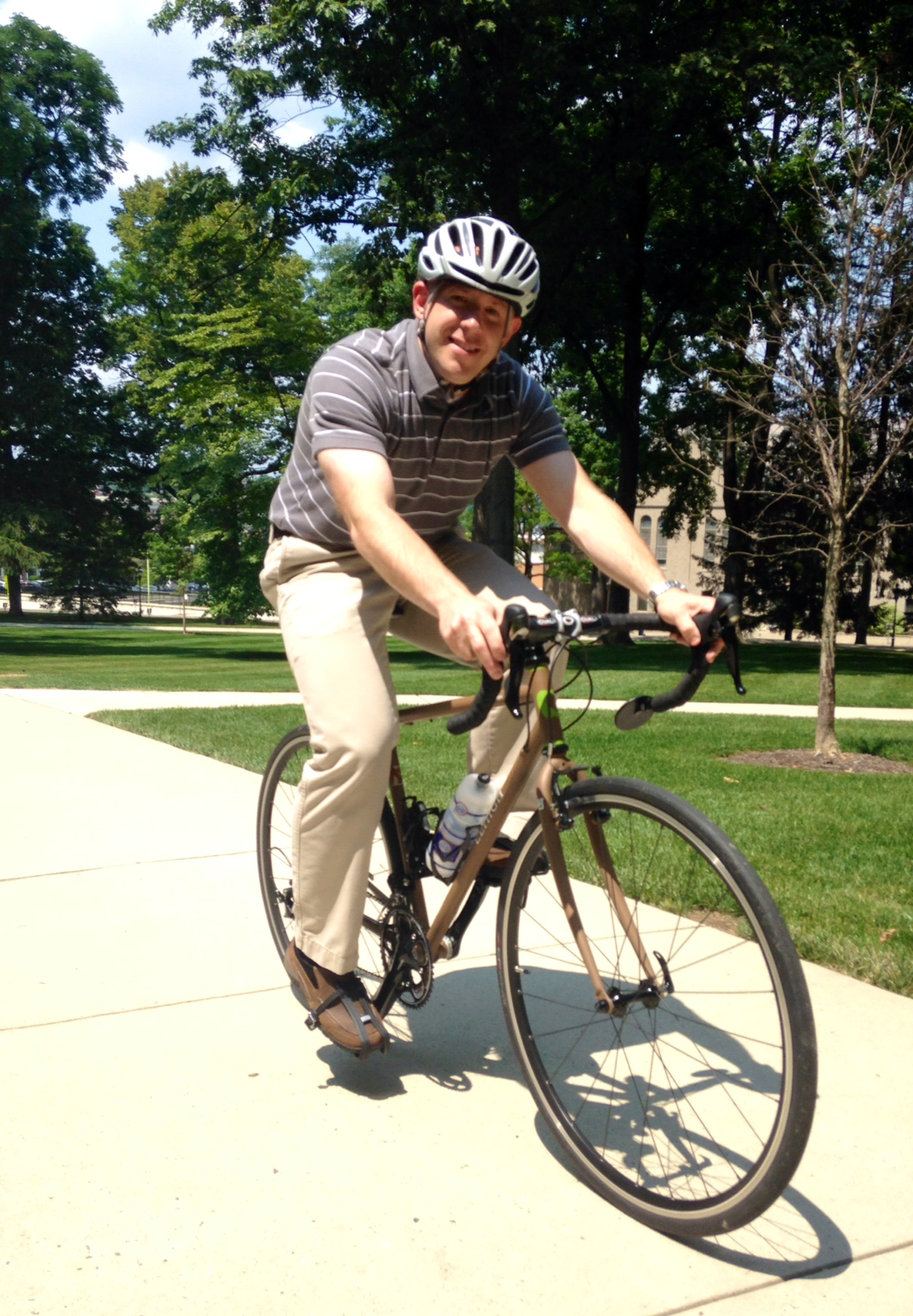A new approach to student health

Peter Costa, director of Health Advancement & Prevention Strategies, practices what he preaches by making his way to campus meetings on a bike designed and built by Lehigh alum, Rich Adams ’94.
Shortly after Peter Costa accepted his new role at Lehigh as director of Health Advancement
and Prevention Strategies, he met with Ron Dendas, a program officer at the Allentown-based
Dorothy Rider Pool Health Care Trust.
During their get-acquainted discussion, Dendas challenged Costa to consider what efforts he
could undertake that would actually make a difference in the lives of Lehigh students, and that
could endure long after Costa moved onto his next challenge.
“I thought a lot about that,” says Costa, who came to Lehigh in 2012 after working for national
and international health organizations. “It took me about two weeks to settle on the realization
that the work of this office would have to involve faculty and people across campus in order for
it to really be effective since student health isn’t something that is confined to just one office or
area. It’s really everyone’s job. Creating and sustaining a safe and healthy campus is everyone’s
responsibility.”
New approach
Since his arrival, Costa has taken stock of existing health education and prevention efforts and
retooled them to engage far more individuals, align programming and assessment with national
standards, and create new programs that address top health concerns among college students:
stress, depression, eating disorders, sleep difficulties, binge drinking and prescription drug abuse.
Costa’s efforts are in line with a new approach championed by John Smeaton, vice provost of
Student Affairs, who recognized an important opportunity to enable students to achieve their full potential in and outside of the classroom. “It is clear, both from the research and our own experience, that a comprehensive approach to personal health will serve our students well during their time on campus and beyond,” Smeaton said.
For the past two years, Lehigh has been participating in the National College Health Assessment
(NCHA), which is a nationally recognized research survey that assesses student behaviors and
identifies needs for services and programs. Areas of focus include alcohol, tobacco and other
drug use; sexual health; weight and nutrition; mental health and personal safety. Once a year,
undergraduate and graduate students are randomly selected to participate in this confidential and
anonymous web-based survey.
The data collected allows Lehigh administrators to better understand campus-specific behaviors
and place them in a broader context. It also, Costa says, is just good public health practice to
share that data.
“By looking at the data, it also allows us to set goals for behaviors we might want to encourage,”
Costa explains. “For example, we might see that in 2014, 42 percent of Lehigh students were
vaccinated against the flu. By having that baseline, we could identify a goal for 2020, as well as
the strategies, approaches and resources we would need to reach that goal.”
An additional benefit is providing fodder for secondary analysis by faculty, staff and students who might be conducting health-related research for a class project, practicum or publication.
He also worked with the faculty of Lehigh’s Health, Medicine and Society program to create a credit-bearing course for highly trained Peer Health Advisers, who help advance health and
safety of fellow students by offering support and connections to resources and programming.
This past academic year, students who went through the program earned two credits. In the
Spring 2015 semester, students will earn four credits for the course.
An additional development has been the Red Watch Band Program, a peer-based alcohol
bystander intervention program that provides the knowledge, awareness and skills to recognize
when a fellow student may be experiencing alcohol poisoning and may be in need of medical
attention. Red Watch Band teaches students how to confidently handle alcohol emergencies
and summon professional help through interactive discussion, skills training and dynamic role
playing. It also familiarizes students with Lehigh’s Medical Amnesty Policy so that there is no
hesitation in getting medical attention.
Costa and Smeaton are considering additional initiatives, such as expanding the “Installment”
program, which places practical health information in bathroom stalls in academic buildings, and
building a foundation for broader educational and programmatic efforts.
“It’s clear that anything that we do to reach students has to evolve beyond one office,” Costa
says. “We will need the support of faculty, who can help identify students who might be
struggling with some of these issues and put them in touch with resources, as well as staff,
administrators, parents, and alumni who can help us understand and address these issues in a
broader, more effective way.”
Just as healthier employees are more industrious, Costa said, healthier students are better learners.
“Lehigh students can make the most of their experience by consciously making positive and healthy lifestyle choices that will enable them to succeed inside- and outside the classroom. Many of the habits learned at Lehigh will endure after graduation. My hope is that I will have met Dendas’ challenge and made some small difference in the lives of these students.”
Posted on:

